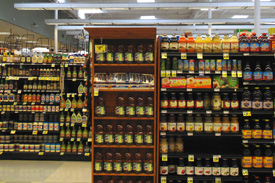Oct 29 2013
New research from North Carolina State University and the University of Minnesota finds that people in the United States want labels on food products that use nanotechnology – whether the nanotechnology is in the food or is used in food packaging. The research also shows that many people are willing to pay more for the labeling.
 Study participants supported labeling products in which nanotechnology had been added to food, as well as products in which nanotechnology had been incorporated into the packaging.
Study participants supported labeling products in which nanotechnology had been added to food, as well as products in which nanotechnology had been incorporated into the packaging.
“We wanted to know whether people want nanotechnology in food to be labeled, and the vast majority of the participants in our study do,” says Dr. Jennifer Kuzma, senior author of a paper on the research and Goodnight-Glaxo Wellcome Distinguished Professor of Public Administration at NC State. “Our study is the first research in the U.S. to take an in-depth, focus group approach to understanding the public perception of nanotechnology in foods.”
The researchers convened six focus groups – three in Minnesota and three in North Carolina – and gave study participants some basic information about nanotechnology and its use in food products. Participants were then asked a series of questions addressing whether food nanotechnology should be labeled. Participants were also sent a follow-up survey within a week of their focus group meeting.
Study participants were particularly supportive of labeling for products in which nanotechnology had been added to the food itself, though they were also in favor of labeling products in which nanotechnology had only been incorporated into the food packaging.
However, the call for labeling does not indicate that people are necessarily opposed to the use of nanotechnology in food products. For example, many study participants indicated support for the use of nanotechnology to make food more nutritious or to give it a longer shelf life – but they still wanted those products to be labeled.
“People do have nuanced perspectives on this,” Kuzma says. “They want labeling, but they also want access to reliable, research-based information about the risks associated with labeled products – such as a Food and Drug Administration website offering additional information about labeled products.”
The researchers also found that about 60 percent of the study participants who responded to the follow-up survey were willing to pay an additional 5 to 25 percent of the product price for either nanotechnology-free products or for nanotechnology labeling.